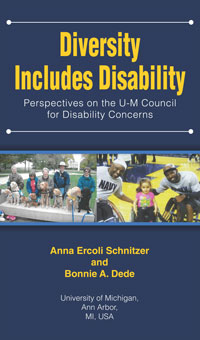
Diversity Includes Disability: Perspectives on the U-M Council for Disability Concerns
Skip other details (including permanent urls, DOI, citation information): This work is licensed under a Creative Commons Attribution-NonCommercial-NoDerivatives 4.0 International License. Please contact mpub-help@umich.edu to use this work in a way not covered by the license.
For more information, read Michigan Publishing's access and usage policy.
Cultural Changes on Campus Effected by the Council about Disability
We believe that most thoughtful people will agree that while advances in technology to improve life for those with disabilities are tremendously impressive and are occurring rapidly, changing the culture is an inordinately difficult, if not impossible, challenge and therefore must be a perennially ongoing, sustained mission. As a result, the council has had to be innovative, planning about how to capture the community’s attention and thereby by gentle advocacy sometimes to change minds and hearts. We have tried to do this through partnerships, through sponsoring athletic activities, through referrals and support, through community building, and through providing education and inspiration on campus. We believe that although council members meet for only one hour, once a month throughout the year, the long-term team effort of the U-M CFDC has been effective in making a positive, innovative change in the cultural attitude toward disability issues on campus and thus in definitely enhancing it.
In the over thirty years of its existence, these changes have been gradual but consistently incremental; however, in recent years, the council has truly come into its own and, we believe, has had a ripple effect campus-wide. Through its annual outreach, educational, advocacy, and destigmatizing presented in the annual Investing in Ability series of events, the council is reaching out and influencing other campus units. This effort has been officially recognized in a Regents’ Meeting in recent years. Council members are particularly grateful in having had a number of “champions” among the Regents over the years. They have all been reachable and receptive to the progress being made in the area of accessibility on campus. We feel very hopeful that these changes will continue in that we are envisioning a future innovative shift of the entire campus culture in which disability will become an accepted part of diversity, in which universal design will be automatically integrated in every campus plan and building design, and in which there will be total accessibility for everyone and nobody will feel stigmatized or marginalized because of physical, mental, emotional, or cognitive differences. These are, and continue to be, the important “outside the Cube” goals of the U-M CFDC. We also hope, naturally, that what we have done to date and continue to do as a council can be applied to other institutions. While changes in culture can never be readily quantified or evaluated on a financial basis, in our particular area of interest, the rewards come in terms of improved daily living for all those in our campus community and thereby making the University of Michigan an even better place. In addition, we believe that our goals can be replicated elsewhere, and we would very much like to serve as a model for as many other universities as possible. And the council work continues . . .


